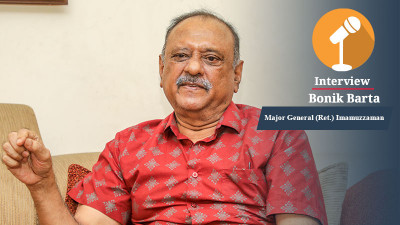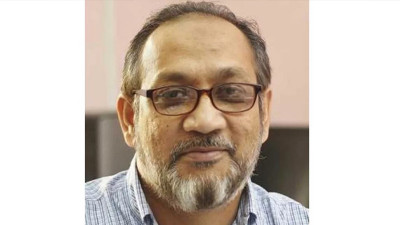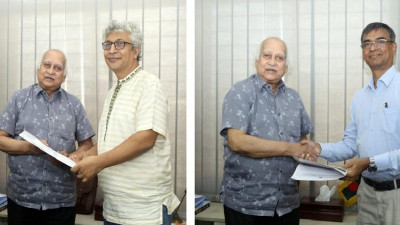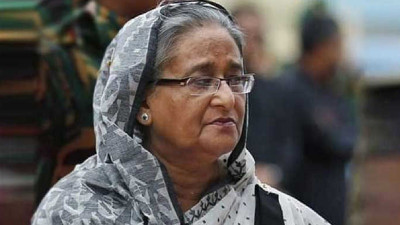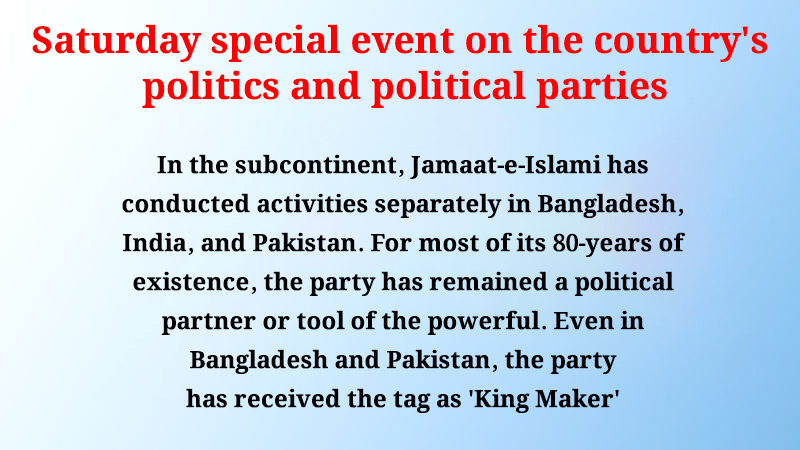 Photo: Bonik Barta
Photo: Bonik Barta Eight decades ago, Jamaat-e-Islami Bangladesh emerged as
a political party. For most of its 80-years of existence, the party has
remained a political partner or tool of the powerful. Besides Bangladesh,
Jamaat also operates in Pakistan and India. Occasionally, in Bangladesh and
Pakistan, the party has faced bans as a 'King Maker'. Most recently, on
Thursday, the government issued a proclamation banning the party in Bangladesh.
Jamaat-e-Islami has encountered challenges not only in
Bangladesh and Pakistan but also in India, facing multiple instances of bans.
Over time, authorities have alternately prohibited and engaged with the party
according to their political interests.
Founded in 1941 under the leadership of Maulana Abul A'la
Maududi, Jamaat-e-Islami initially operated as Islamic Hind during a journey
through Lahore's Islamic Park. Shortly afterward, its central office was
relocated to Pathankot in India. Initially asserting itself as a social
organization, Jamaat advocated for societal change based on Islamic principles.
Over time, it evolved from a social to a political organization, becoming
significantly influential in the politics of India, Bangladesh, and Pakistan.
In this context, Dr Badiul Alam Majumdar, the executive
head of SHUJAN (Citizens for Good Governance), said to Bonik Barta, “The
Jamaat’s influence is on the path of power. This is their place of attraction.
The power of the party they go with increases the path of Jamaat. Whatever the
public opinion, Jamaat is so attractive for the power of the path. Both Awami
League and BNP have played with this party. The Awami League made a movement
with them. BNP formed the government with them. If BNP relinquishes Jamaat, the
Awami League will immediately take them by surprise.”
Regarding this matter, a former Minister of Water
Resources during Ershad's regime, Major (Retd.) Manjur Kader said, amidst cold
war and at the later part of 1970s Jamaat-e-Islami experienced growth. In Bangladesh,
Jamaat found another opportunity in politics during the tenure of President
Ziaur Rahman. Even under Ershad's rule, this trend continued uninterrupted.
During this time, the party also received assistance from various Middle
Eastern countries. Concurrently, Ershad himself maintained strong relations
with Western countries after his departure from Russia. In summary, Jamaat
managed to establish itself. However, in subsequent times, other political
parties also conducted movements against Ershad or usurped power from him.
Nevertheless, due to the global impact of the 2001 Twin Tower attacks,
Islam-based politics also influenced Bangladesh. As a result, Awami League did
not keep Jamaat with itself anymore."
He also said, 'When Pakistan's Zia-ul-Haq came to power,
he maintained relations with the Western world during the Cold War. As a part
of this, they also gave Jamaat-e-Islami an opportunity. Later, due to the end
of the Cold War, Jamaat-e-Islami lost that place.
At one time, Jamaat-e-Islami raised its voice against the
creation of Pakistan. At that time the party was seen in many places as a
supporter of the British. The party became active in politics after the
creation of Pakistan. The group was divided into two groups. The party was
divided into Pakistan Jamaat-e-Islami and Jamaat-e-Islami Hind.
Jamaat-e-Islami was banned twice during the Pakistan
period. The first time was during the reign of military ruler Ayub Khan in
1958. Jamaat was also banned, along with all other parties, during the course of
political events that year. Half a decade later, the party was banned again.
The party was banned for the second time in 1964, but the ban was lifted in the
same year.
In Pakistan in 1977, Zia-ul-Haq took power by
overthrowing the then President Zulfikar Ali Bhutto through a coup. From the
beginning, he started taking the support of parties like Jamaat to garner
public support.
According to an article published in Pakistan's media
outlet Dawn, Jamaat-e-Islami supported the 'jihad' against the Soviets in Afghanistan
during the tenure of Zia-ul-Haq. The party endorsed Zia-ul-Haq, who led an
anti-Moscow campaign in Pakistan. Following his death, Jamaat gradually
distanced itself from centers of power in politics. It joined an Islamist
coalition (Islamic Jamhoori Ittehad or IJI) under the leadership of Nawaz
Sharif in the 1998 general elections to oppose the PPP. During the 1993
elections, IJI disappeared from the political scene. Subsequently, Jamaat
repositioned itself as Jamaat-e-Islami Pakistan (JI) and decided to contest
under the name of Pakistan Islamic Front (PIF) to challenge the party.
In 1975, Indira Gandhi banned Jamaat-e-Islami from
participating in politics in the part of Jammu and Kashmir under India's
control. This ban was lifted in 1977 just after two years. As a result, the
party resumed its activities and worked towards its reorganization. Since 2008,
political parties in the Jammu and Kashmir regions have faced challenges that
have affected Jamaat-e-Islami as well. The party now places more importance on
social welfare activities than on autonomous governance. Additionally, its
ideological position has also been impacted.
In 1971, Jamaat-e-Islami took a stance against the
Liberation War, which led to significant controversy in the post-independence
period. Following this trend, in 1972, all forms of religious-based political
parties were constitutionally banned in Bangladesh. This proclamation was made
under Article 38 of the constitution. As a result, all political activities of
Jamaat-e-Islami in Bangladesh came to a halt.
In independent Bangladesh, after receiving a ban for four
years, in 1976, Jamaat-e-Islami managed to overturn the prohibition on
religious-based politics mentioned under Article 38 of the constitution. The
lifting of this ban allowed them to actively participate in the political
arena. However, it took another three years for the party to fully reorganize
itself.
At one time, Jamaat-e-Islami was considered a
"kingmaker" in Bangladeshi politics. It assumed this role during Ershad's
regime when the party gained 10 seats in the 1986 elections under his
government. Since then, Jamaat-e-Islami has become significant in Bangladesh's
politics. In subsequent years, it participated in movements against autocracy
alongside the BNP and Awami League. In the 1991 elections, it won 18 seats and
supported BNP in forming the government. However, in 1994, it was involved in a
movement against the caretaker government led by the Awami League and the
National Party. In the June 12, 1996 elections, Jamaat won three seats. In
1998, it formed an alliance with BNP. In the October 1, 2001 elections, it won
17 seats and became a partner in the government.
After 50 years, Jamaat-e-Islami has once again fallen
under prohibition in independent Bangladesh.
Regarding this, Associate Professor Dr Samina Luthfa of
the Department of Sociology at Dhaka University said, "War crimes have
been proven against Jamaat-e-Islami. The demand to ban Jamaat-e-Islami has been
in the air since before 2013. Awami League has not banned Jamaat-e-Islami until
now. It has done so in crisis. It has been banned in a time when it is not
matter at all. There is a mass uprising regarding other issues. Now, the
biggest demand in the table is to stop the killings."

